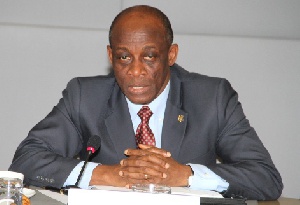 Seth Terkper, Minister of Finance
Seth Terkper, Minister of Finance
There’s one thing standing between Ghana and a new Eurobond sale: the International Monetary Fund’s concern that the West African country may abandon monetary reforms and budget targets in the run-up to elections scheduled for December.
The IMF last week sought a guarantee that Ghana won’t use central-bank funding to sidestep fiscal structures agreed with the Washington-based lender last year, according to people familiar with the matter. Without that assurance, investors probably won’t bite if Ghana tries to tap international markets even as a wall of money floods developing nations in search of high-yielding assets, according to Manulife Investment Management.
West Africa’s second-biggest economy is keen to tap the Eurobond market for the fourth time in as many years, Finance Minister Seth Terkper said last month after the country had scrapped a planned sale, balking at the price demanded by investors. Judging by the performance of Ghana’s existing debt since then, the cost may be lower second time around, provided the IMF gives the all-clear. Sticking Point
“Without an agreement with the IMF, it would be quite difficult to go to the Eurobond market, particularly because investors would know about the sticking point,” Richard Segal, an emerging-market analyst at Manulife, which oversees about $130 of fixed-income investments, said by phone from London. “If they are able to resolve this, it could be quite easy for Ghana to issue.”
Terkper didn’t answer a call or respond to text messages when Bloomberg sought comment. IMF spokesman Osa Ahinakwah declined to comment when contacted by phone.
“Outstanding questions remain with regards to certain elements of the legislation recently passed,” the IMF said in an e-mailed statement on Sept. 2, after Ghanaian lawmakers last month declined to pass a bill that will outlaw borrowing from the central bank. Instead, they’ve reduced a cap on loans to 5 percent of government revenue in the previous year, from 10 percent before.
Ghana’s Eurobonds have returned 4 percent since the beginning of August, compared with the average of 2.9 percent for dollar debt of 17 sub-Saharan African nations, Bloomberg indexes show. Yields on the $1 billion of notes due Aug. 2023 have dropped 110 basis points in the period, reaching a one-year low of 9.22 percent on Aug. 25.
Ghana is considering issuing debt at a time when countries from Saudi Arabia to Papua New Guinea are preparing to sell tens of billion of dollars in Eurobonds before the Federal Reserve increases interest rates. Only two sub-Saharan Africa nations -- South Africa and Mozambique -- have sold dollar securities this year, the latter in a restructuring of existing debt.
The cedi has stabilized and inflation steadied since the country agreed to the IMF’s reforms in April last year in return for a $918 million bailout, implementing measures to strengthen its monetary policy framework and instill fiscal discipline. The currency has declined 1.9 percent against the dollar this year, compared with a 14 percent plunge in 2015 and 26 percent the year before while inflation slowed to 16.7 percent in June from a six-year peak of 19.2 percent in March.
The government’s deficit for the period from January to May this year was 2.5 percent, compared with a target of 2.2 percent. Ghana’s budget deficit in its previous election in 2012 was 12.1 percent of gross domestic product.
The IMF’s review is expected to be completed by mid-September, it said in an Aug. 30 statement.
“Any derailment of the IMF’s program will disrupt the improved sentiment, especially with this being an election year,” Celeste Fauconnier, Nema Ramkhelawan-Bhana and Neville Mandimika, analysts at Johannesburg-based Rand Merchant Bank Ltd., said in an e-mailed note on Monday. “Furthermore, the restraint on excessive government expenditure required by the program” will not be achieved. Wait-and-See
Ghana is committed to achieving its fiscal targets ahead of elections, which will positively affect yields for a bond, Terkper said Aug. 24. Energy-sector debts totaling $1.2 billion, another agenda item in talks between the country and IMF last week, are on the balance sheets of state-owned companies and will be repaid in 10 years through petroleum levies, Terkper said Aug. 31.
“Investors are in a wait-and-see mode. They want to be given some comfort before resuming disbursements,” Michael Cobblah, a director a C-nergy Ghana Ltd., an advisory and investment banking services company in the capital, Accra, said by phone. “Ghana needs a positive review for the bonds to succeed.”